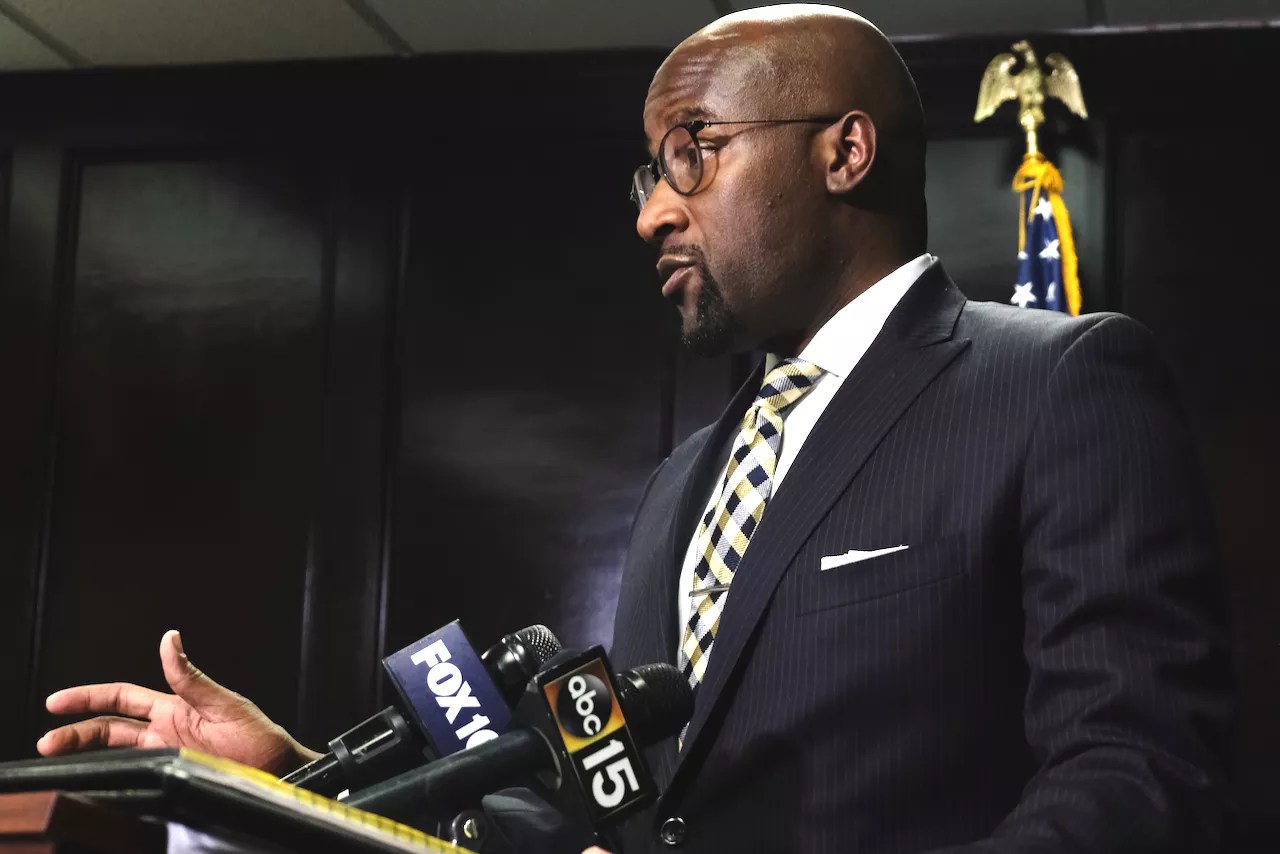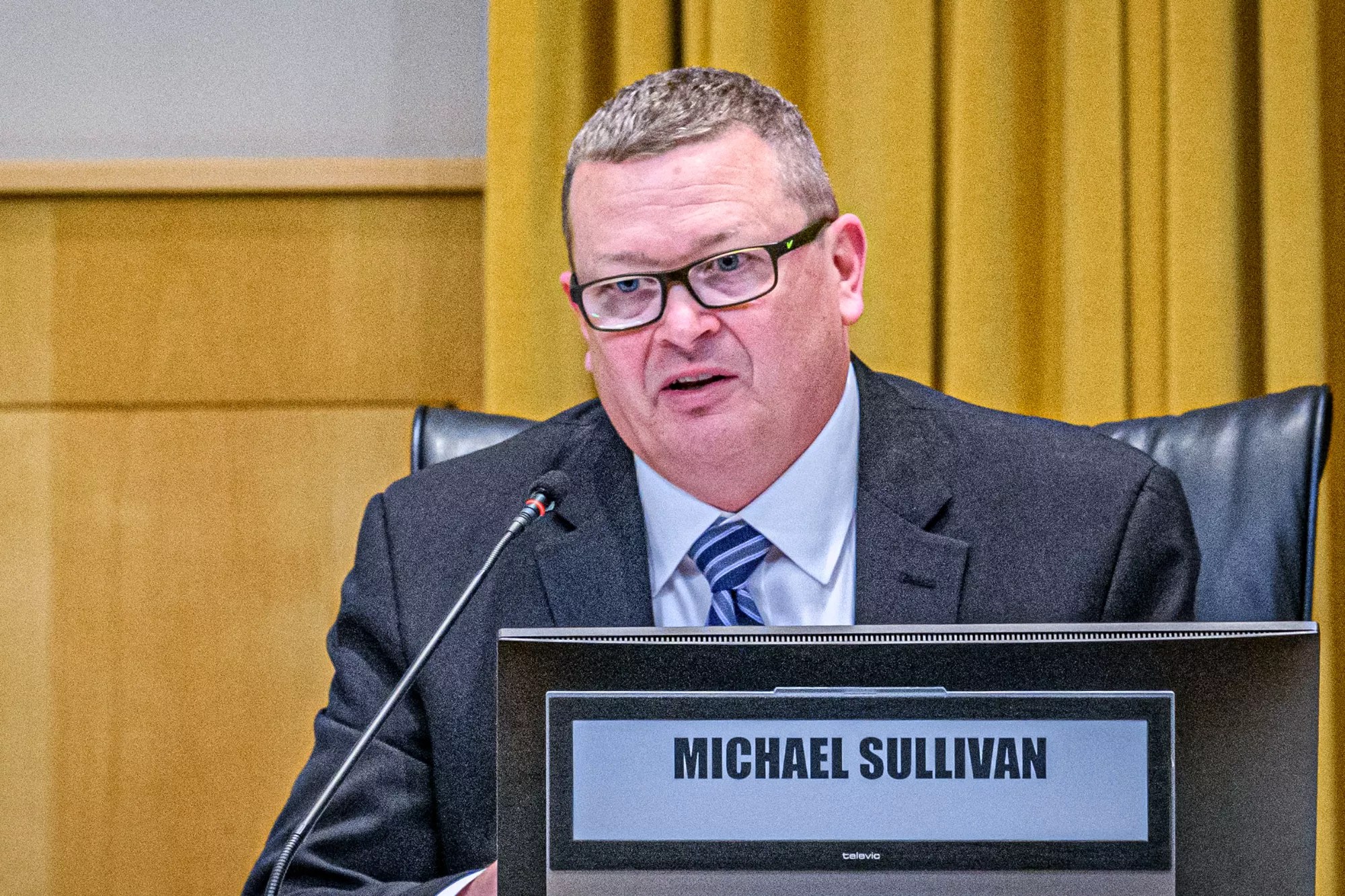
Katya Schwenk

Audio By Carbonatix
Last June, the U.S. Department of Justice dropped a 126-page bomb on the Phoenix Police Department. After years of investigation, the DOJ issued a lengthy report documenting how Phoenix police officers consistently and systematically violated the civil rights of residents. The report was a means to an end – a DOJ push to submit Phoenix police to independent oversight.
That report was written when Joe Biden was in the White House and the DOJ had more of an appetite for curbing wayward police departments. Now that Donald Trump is president, the idea of suing Phoenix to mandate reforms went out the window when he reentered the Oval Office. But the report remained.
Not anymore – sort of. At Trump’s direction on Wednesday, the DOJ tried to put the proverbial toothpaste back in the tube. Wednesday morning, the DOJ officially rescinded the report, “retracting the Biden administration’s findings of constitutional violations” committed by Phoenix police and at least seven other law enforcement agencies across the country. As of Wednesday afternoon, the Phoenix police report was still on the Justice Department’s website.
The decision to revoke the findings was announced just a day after Phoenix New Times reported the police department is the second-deadliest police force in the country. Since 2013, encounters with Phoenix officers have caused the death of 173 people, according to an analysis by the accident and injury firm Gammill Law. Only the Los Angeles Police Department killed more people.
Arizona politicians reacted to the news with a mix of braggadocio and reserved approval. Republican Arizona Senate President Warren Petersen applauded the end of the DOJ “witch hunt” – without actually refuting any of the report’s specific findings or facts – while GOP Rep. Abe Hamadeh tried to claim some credit for the report’s rescission. The Phoenix City Council’s lone Republican, Jim Waring, said at a Wednesday council meeting that the decision was “outstanding news” and dismissed the report as “misguided.”
Democrats – including those on the Phoenix City Council, which resisted oversight and seemed to be running out the clock with the DOJ in case Trump was elected – have reacted more tamely.
In a statement, Vice Mayor Ann O’Brien highlighted the department’s reform efforts and said, “I have always been a strong proponent that the City Council is capable of making necessary changes without costly federal oversight.” Councilmember Debra Stark said in a statement that she “was very concerned about the findings of the DOJ report, but knew that our police department was already working on necessary changes.” Rep. Greg Stanton, the former mayor of Phoenix, released a statement that did not address the report being rescinded.

Quacy Smith, a local civil rights attorney, frequently has represented the families of victims of police misconduct.
Katya Schwenk
Gone but not forgotten
The DOJ report may be officially pulled back, but it hardly vanished into thin air.
It seems some Republicans want to wave a magic wand and erase the report from the collective consciousness, 1984-style. But considering many of the report’s critics have yet to mount an evidence-based refutation, that seems unrealistic.
“For the large part, the findings were substantial and not challenged on their terms,” civil rights attorney Bob McWhirter told New Times. “None of the problems identified in that report – following an extensive investigation – have been fixed.”
To paraphrase Eddie Vedder, some reports, when released, can’t be taken back. The DOJ’s report has been public for nearly a year and widely circulated, and the notion that the Trump administration can erase it from the political zeitgeist verges on delusion.
Last month, former Phoenix City Councilmember Carlos Galindo-Elvira told New Times that “the idea of rescinding the DOJ report might make some feel good, but it doesn’t erase what was written.” In a text message Wednesday, Galindo-Elvira said that interview “now seems prophetic.”
So, what does the DOJ’s rescission decision mean practically and for people who contend their rights have been violated?
For one, yanking back the report hardly alters the reality on the ground. The DOJ report extensively documented a widespread pattern of civil rights violations carried out by Phoenix officers, including discriminating against people of color, using excessive and unnecessarily deadly force and arresting unhoused people without cause.
The DOJ said that the department taught officers tactics that were “dangerous, unnecessary and unreasonable,” including that all force – even deadly force – would lead to de-escalation. The DOJ also found that officers fired their weapons at people who presented no immediate threat and improperly used choking tactics, including on people who had not committed a crime.
The city has had to shell out for such abuses in the past. Between 2008 and 2018, Phoenix approved $26 million in settlement money for police violence in 191 cases. In November 2023, the city paid $5.5 million to the family of Ali Osman, who was killed after throwing rocks at an officer during a mental health crisis in September 2022.
Quacy Smith, who represented Osman’s family in that case, said Wednesday that while the DOJ took “a step in the wrong direction” by rescinding its report – a step that he says “places the police and the public in danger” – he thinks the report’s facts speak for themselves.
“The DOJ rescinding their findings does not change what happened in the underlying cases referenced in the report,” Smith said. “Everyone is entitled to their own opinion, but no one is entitled to their own facts.”
In a statement, ACLU of Arizona legal director Jared Keenan echoed that sentiment.
“The DOJ’s damning and well-documented findings came from thousands of records, including hours of videos and interviews with personnel at the Phoenix Police Department. Now is not the time to look away,” Keenan wrote. “Our community demanded accountability long before the federal government stepped in.”
When Trump won the election, civil rights advocates knew that the idea of placing Phoenix police under federal monitoring had become a pipe dream. Still, the report gave attorneys ammunition to use in claims against the city. Lawyers have used it to show that the city failed to curb officers’ violent tendencies – and in many cases, encouraged cops to be more violent.
But after the Trump DOJ’s decision, Smith is unsure if lawyers will use it quite so liberally now. “I’m sure many civil rights attorneys will no longer reference the report as a source,” he said.
Not all lawyers agree. McWhirter told New Times he would continue to reference the report in lawsuits.
“It still can be used in civil cases. The findings are there, so it doesn’t change anything,” he said. “In fact, it makes some of those civil cases better because if they continue these same violations after they were put on notice by the DOJ’s original report, then it shows worse conduct on their part.”

As interim police chief, Michael Sullivan pushed for some reform measures before resigning from the job last month.
Kevin Hurley
Still committed to reform?
The report’s rescission fully removes Phoenix from federal scrutiny, leaving police reform up in the air. For its part, the city says it is still committed to fixing the issues the DOJ identified.
Phoenix has maintained that argument all along. Before the report was released, the city pushed back publicly against the suggestion that its police force required independent oversight. Councilmembers argued – as did former police Chief Michael Sullivan in a closed-door December 2023 meeting with the press – that the department can reform itself more effectively.
Whether that’s true remains to be seen. Under Biden, the DOJ didn’t buy the city’s claims that it could police its own police and threatened to sue if Phoenix didn’t accept any oversight mechanisms.
The city’s ability to create change also has been called into question by the bitter resignation of the head of Phoenix’s Office of Accountability and Transparency in 2024, who said city officials stifled his every attempt to make the agency “independent and robust,” like the city claimed it was. The city also created a watered-down civilian review board, which has limited powers to impose change upon the police department.
Phoenix cops managed to stir up a huge controversy just months after the report was released. Last year, ABC 15 revealed two Phoenix cops had beaten and arrested a deaf, Black man with cerebral palsy, jailing him for 24 days on bogus assault charges. Arrest video publicized by the station resulted in the Maricopa County Attorney’s Office dropping the charges against the man, who is now suing Phoenix over the incident. Three cops involved in the arrest were suspended by the department for only 24 hours.
Despite that, city officials insist that the department is well on its way to reforming itself, having already implemented a new use-of-force policy last year. City spokesperson Dan Wilson said the city has no plans to remove mentions of the report from its website, where it posted numerous police files mentioned in the report in order to show transparency.
“From the outset of this process, the City and Police Department viewed the DOJ investigation as an opportunity to evaluate our operations, reflect on areas for growth, and reaffirm our commitment to delivering the highest standard of service,” Wilson said in a written statement. He added that “significant progress is already underway and will continue as we fulfill our responsibility to serve and protect the community while building trust through transparent, effective, and constitutional law enforcement practices.”
McWhirter was skeptical. “There’s no evidence they’re making such progress,” he said.
Similarly, activists in Phoenix urged city officials to heed the report.
“Now, more than ever, City of Phoenix leadership has a responsibility to acknowledge, validate, and take accountability for these findings,” Ben Laughlin of Poder In Action said in a written statement.
The department is now facing a new, uncertain chapter – let off the hook by Trump but having made big promises about being mature enough to handle its business. On top of that, it’s looking for a new chief. Sullivan, who helmed the department on an interim basis since 2022, resigned last month and took his name out of consideration for the permanent gig. The city has restarted its chief search from scratch.
Whomever they pick will face a large challenge. Sullivan pushed for some reform during his time as chief. Not coincidentally, the rank-and-file disliked him. That likely means one thing for Sullivan’s successor: If whoever takes the reins is serious about reforming Phoenix police, they’ll have to force the department to eat its vegetables.
And Trump just told the cops that it’s ice cream for dinner.